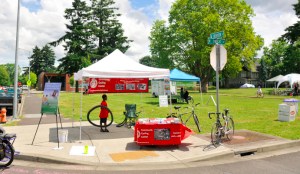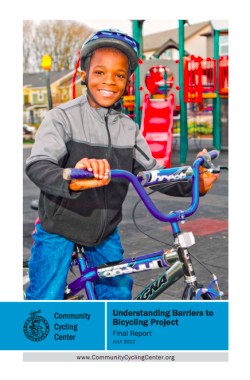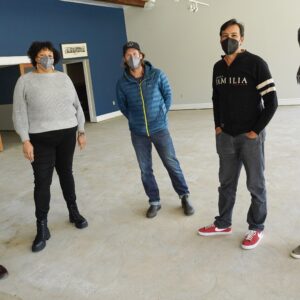
(Photo © J. Maus/BikePortland)
The Community Cycling Center has finalized their plans to build a ‘Bicycle Repair Hub’ in the New Columbia neighborhood of north Portland. According to a statement released this morning, the CCC will build the facility this month with community-led design charrettes beginning August 20th and final construction expected to be completed 11 days later.
The quick construction turnaround is made possible through a partnership with graduate students from a joint MFA program in Applied Craft and Design at the Oregon College of Art and Craft and the Pacific Northwest College of Art. The Bike Repair Hub will be the graduating class’s intensive design/build project that turns empty spaces into “dynamic and creative learning centers.”
For the CCC, this project represents a major milestone in their ongoing efforts to remove barriers to bicycling faced by ethnic minorities and low-income Portlanders. The New Columbia neighborhood looks a lot different than most in Portland. 70% of the residents qualify as low-income and they come from 22 different countries and speak eleven different languages. Underscoring how this project is related to their “Understanding Barriers to Bicycling” work we first reported on back in 2009, the CCC chose today to release the final report of that project. (We shared the project’s initial findings in April 2010).

Unlike the programmatic work of outreach and education non-profits are usually known for, this new bike repair hub is a physical manifestation of the CCC’s efforts to make bicycling accessible beyond the usual suspects.
“Though Portland is known for being great at many things, including being the best bicycling city in the United States,” reads a CCC press release, “this does not represent everyone’s reality. There are complex and interrelated barriers – including cost, safety, and education – that put bicycling out of reach for many low-income people.”
Alison Graves, executive director of the CCC said today that,
“Since completing our ‘Understanding Barriers to Bicycling Project,’ we have fundamentally changed the way we work… simultaneously removing barriers that build community while showing a different way for bicycle organizations to engage. These collaborations have shifted and enriched our organizational culture, with a focus on diversity and inclusion. This evolution has given us the ability to influence policy investments and ensure equity is a priority.”
So, how exactly will this Bike Repair Hub break down barriers to bicycling? It will provide affordable bike repair and maintenance clinics and it will serve as a meeting spot for weekly bike rides through the neighborhood. The rides will be led by volunteers from We All Can Ride (Facebook), a group of New Columbia residents that serve as the community’s bike committee and that emerged in large part because of the CCC’s presence in their neighborhood.
This project was made possible with support from Bike Gallery, Home Forward, the Portland Development Commission and a $10,000 grant awarded last November to the CCC by national bike advocacy group Bikes Belong.
— Download the Understanding Barriers to Bicycling Final Report (PDF).
UPDATE: Initially, the CCC planned to include a bike skills park and/or a pump track at this location along with the repair facility. I didn’t see any mention of that in today’s announcement so I asked the CCC for a clarification/update. It looks like that part of the project is delayed. Here’s more from the CCC’s communications director Melinda Musser:
“We have plans to build a permanent Bike Skills Park by June 2013 on the same lot as the Bike Repair Hub. We originally intended to build a pump track, however, there were funding and maintenance limitations with the grant for that project. We are currently working with the We All Can Ride bike committee and a designer to figure out what the Bike Skills Park will look like. Once the designs have been approved, we will keep you posted on that project.”



Exciting!
It is still hard for me to grasp that biking-as-transport (as seen in the Emily Finch story comments and elsewhere here) is something we tell ourselves rich white people can more easily ‘afford’ than others not so endowed. For this to be true (and I’m coming to terms with it) something has to have gone very wrong along the way.
It’s worth noting that this is very close to the North Portland Connector greenway (which is not complete, but getting close).
i taught bike education at Rosa Parks Elementary. I have seen as many kids on bikes anywhere in Portland as I have at New Columbia. This hub will be a great community asset in one of the most diverse, dynamic, and vibrant communities in Portland.
charrettes, had to look that one up… this place is getting to sophisticated for me… (:
good to see the CCC stepping out of their comfort zone to spread the good word of bicycles…
I don’t have a clear idea of what a “Bike Repair Hub” actually is. Is there description of the concept? Of what is it comprised? Who operates it? I didn’t see a description in the CCC press release either.
The Community Cycling Center will be operating the Bike Repair Hub with support from the residents, community volunteers, and We All Can Ride, a resident-led bike committee in New Columbia. The Hub will have tools for the bike committee to lead repair clinics. It will also serve as a meeting spot for community bikes rides.
Yes! Everyone learns to fix their own bikes and knows where to find the necessary tools! This is half the fun of bikes–you can learn to fix and maintain it yourself. Reading through the report (a good read – thanks) I was struck by the many comments that suggested people in these communities feel bikes are too expensive and repairing them is too expensive.
What that tells me is that people don’t know where to find used bikes, and don’t know (haven’t asked?) anyone who could show them how to fix their bike. I’m shocked and intrigued that folks, entire communities, could have drifted so far from an understanding of and affinity for bicycles, but I’m glad all this is being worked on by the Community Cycling Center.
I totally agree. I think the part that baffles me is that when people speak of buying and maintaining a multi-thousand dollar car (even a piece-o-s#!% beater) there need be no discussion about “how to fix it” Instead, the discussion is “do you know a trust-worthy shop” which I gather means there are tons of non-trustworthy shops. I can’t imagine a cheaper, more reliable way to get around than my bike–and while I do fix mine myself, I also LOVE to drop the price of a car oil change on a YEARLY tune-up at the bike shop. Where did we get the idea that a bike is too expensive to buy and maintain but a car is not?
“Where did we get the idea that a bike is too expensive to buy and maintain but a car is not?”
Car head?
Unhelpful framings that persist and which suggest that bikes are (primarily) things tourists use to access pretty places?
Sometimes I feel like we’ve so screwed up our collective approach to things that it is hard to know how to extricate ourselves from this nonsense, to right this ship.
To quote a bit more from that report. Some folks interviewed pointed out that ‘bikes came into our neighborhoods with drug dealers in the ’90s,’ the unmistakeable message being that to ride a bike in this community is now tainted through this association.
Fine, not going to argue with that. But how is it that the terrain was uncontested, that there were no other groups within the African American community in the late 80s who were riding bikes and who could have in theory offered a counter to this influx. Blaming drug dealers is one thing. Asking how bikes came to disappear in the first place is I think another and at least as interesting a question.
Perhaps the bike affordability question can be rethought. For one, tents are cheaper than houses, but people choose to live in houses anyway, because of what houses offer over tents. If a person has chosen a car over a bike, they have their reasons. Cars as a choice of the people here is ultimately fictional, though, as New Columbia is the least “car-ed” neighborhood in the city of Portland…
The amount of factors behind why different populations of people have different life experiences is astonishing. Brain development is influenced by the experiences of our mothers in utero and throughout our childhood, plus, there ancestral memory is real, and all of these factors are just how we start out in life and leads us to have different perspectives in adulthood.
Many of the people in New Columbia have been exposed to some form of violence at some time, including poverty. Poverty and other forms of violence can easily injure brains. Especially poverty because the brain is hardwired to handle one-time big traumatic events and not incessant hits.
Even if a person arrives in adulthood with optimal brain development…if their income is very low, just having a low income takes up brain space and compromises one’s focus and judgement.
But we at New Columbia are not a bunch of walking zombies with our brain capacities hollowed out. Everyone gravitates toward healing and what heals us here may not be tied to bikes.
Much of what I have discussed are the socio-political determinants of health. They are nonlinear and dynamic and quite often sum to persons here having a totally different set of priorities than persons who have had different lives and histories.
With positive experiences and over time, only, brains can heal and compensate, some, for what cannot be healed.
As a bike promoter in New Columbia, I do think that bikes are very good ways to empower and heal, so I promote biking with compassion and understanding, and by using what is already working well in this community.
I know this is a long response, but community and diversity work is such a huge and often misunderstood field.
Yvette Maranowski
bike promoter
community health worker
member of We All Can Ride
“They are nonlinear and dynamic and quite often sum to persons here having a totally different set of priorities than persons who have had different lives and histories.”
Agreed, and well put. Thanks for posting these thoughts.
I do have a question, though. You wrote: “Everyone gravitates toward healing and what heals us here may not be tied to bikes.” I think that is a useful reminder to someone like me who is tempted to think that bikes, while not the answer to the worlds problems, are a pretty important one, and that most of us would do well to get to know bikes if we don’t already, that mostly/only good can come of that. We don’t seem too far apart on that, as you also wrote: “I do think that bikes are very good ways to empower and heal, so I promote biking with compassion and understanding, and by using what is already working well in this community.”
Can you elaborate on the circumstances under which ‘what heals us may not be tied to bikes’? I’d like to understand that a little better. Thanks.
So is this like a small-scale shop that’s staffed with volunteers during regular hours? Something like the Bike Farm?
full text of the press release is here
http://www.communitycyclingcenter.org/index.php/press-release-community-cycling-center-to-build-a-bicycle-repair-hub-in-north-portland-neighborhood/
it does sound somewhat similar to bikefarm, but it is of course farther north, and the outreach seems a bit more or differently structured
Awesome collaboration between all involved. Can’t wait to see people using it!! Way to go.
So funny how there are such concerns about funding the pump track.
We have many eager volunteers waiting to dig.
Some fuel for the dump trucks dropping the dirt, some sandwhiches for the volunteers.
I have already designed a number ofoptions for the pump track in the New Villa. This space will make for an fairly easy build also.
Fall is the time to start digging…
As in very soon!
Surely these funding issues must be beauracratic, as free labor/designr is a very good price.
A bike repair hub would be greatly complimented by Portland’s second public pump track and skills course.
Can you tell me where I can learn more about the pump track? I live in the neighborhood & both myself and my roommate are eager to help out in the creation & maintenance of a hopefully beneficial asset to the community.